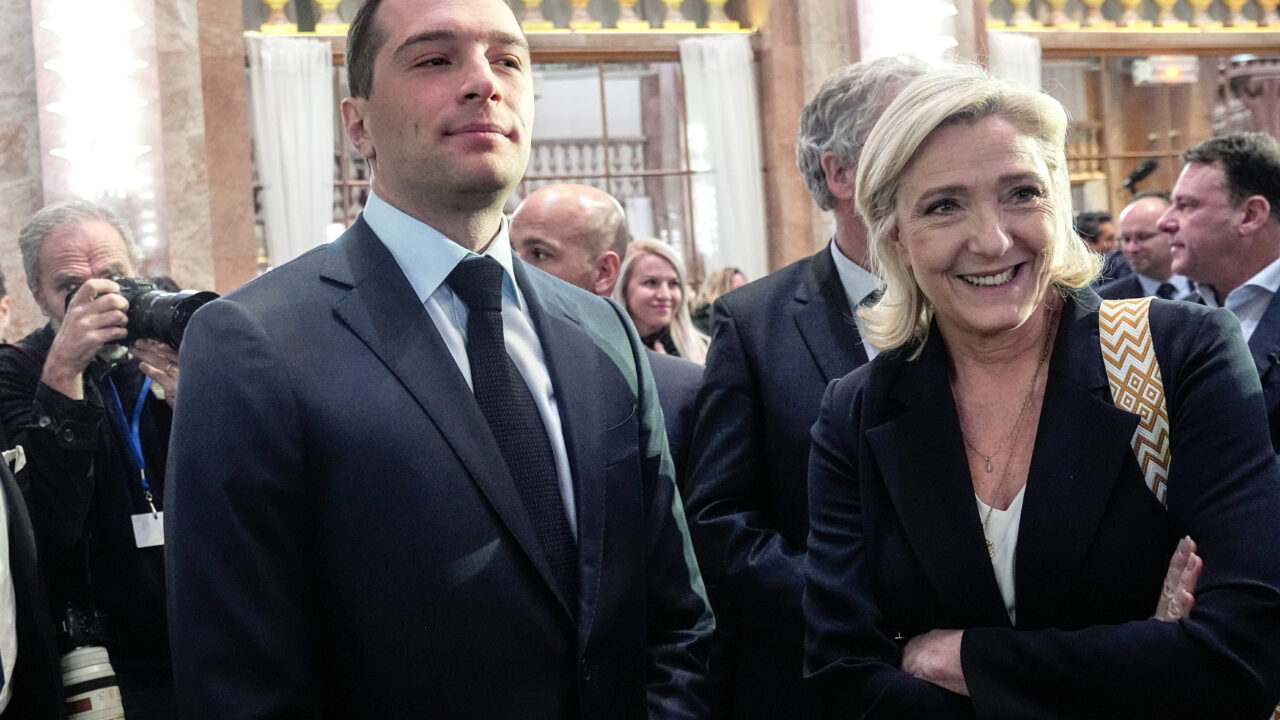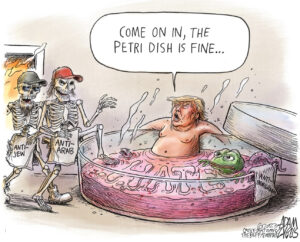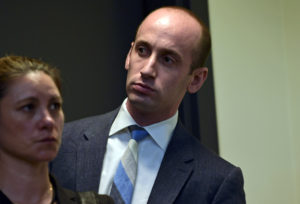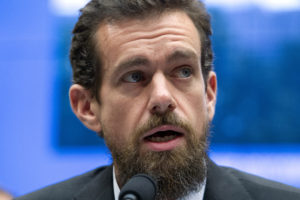Populist Drift in EU Elections Signals Ukraine Shift
War fatigue may be more of a subtext than a theme, but it still doesn't bode well for Kyiv. French far-right National Rally party president Jordan Bardella stands next to party leader Marine Le Pen after the New Year's speech to the media in Paris, Monday, Jan. 15, 2024. (AP Photo/Michel Euler)
French far-right National Rally party president Jordan Bardella stands next to party leader Marine Le Pen after the New Year's speech to the media in Paris, Monday, Jan. 15, 2024. (AP Photo/Michel Euler)
Elections to the European Parliament in June are shaping up as a test of the potential ascendency of the nationalist-populist right across the European Union, further complicating regional support for Ukraine.
Turnout for the EU parliamentary contest is expected to be unusually high because of a much-anticipated populist surge, and efforts by establishment parties to counter and reverse this evident trend. While the populists’ projected success in the coming elections appears mainly reflective of popular anxiety over unchecked “irregular arrivals” of asylum seekers and other migrants, many question the EU’s strong commitment to sustaining a high level of military financial aid to Ukraine.
Ukraine fatigue, therefore, is a subtext rather than the theme of the June election, with both immigration and EU measures to advance its green agenda mobilizing populist parties’ support.
The European Parliament elections are contested only within each member country by its domestic political parties. The elected MEPs from national parties join broad ideological or programmatic groupings (composite parties) in the European parliament. To date, a pro-European cordon sanitaire against the extremes of left and right has been formed by the center-right (European People’s Party or EPP), the center-left (Socialists & Democrats or SD) and the centrist liberals (Renew).
Turnout for the EU parliamentary contest is expected to be unusually high because of a much-anticipated populist surge, and efforts by establishment parties to counter and reverse this evident trend.
The Greens join this coalition on many issues as well. This “grand coalition” is expected to lose seats in the coming elections, with the national populist right parties gaining in relative strength. As this forecast has been broadly understood, it is possible that the mainstream parties can modify and energize their appeal to voters in the months before June. This challenge will in any case mean the European Parliament election has a much higher profile and significance than usual.
The Identity and Democracy (ID) party grouping, whose principal members are the Alternative for Germany (AfD), Marine le Pen’s National Rally (RN), Geert Wilders Party for Freedom (PVV), Italy’s League, and Austria’s Freedom Party, is expected to become the third largest EP grouping, up from its sixth-place finish in the elections of 2019. The national parties in ID advocate cultural traditionalism, tighter controls on immigration, moving authority from Brussels back to national governments, and a negotiated outcome in the Ukraine-Russia war.
Slightly more centrist than ID, the European Conservatives and Reformists (ECR) grouping, is also forecast to gain seats. The ECR includes Georgia Meloni’s Brothers of Italy, Poland’s Law and Justice, and Spain’s Vox. The ECR parties are more disposed than those of the ID group to continue NATO and EU backing, including weapons exports, to Ukraine.
Hungary’s ruling Fidesz party quit the center right EPP in 2012 under threat of expulsion or suspension over its rule of law dispute with the European Commission, and its MEPs have since been formally unaffiliated. Prime Minister Viktor Orban has indicated interest in joining the ECR group. Even if they remain unaffiliated, Fidesz MEPs will in practical terms belong to the populist bloc formed by ID and ECR. Hungary will also have the rotating presidency of the EU in the second half of 2024, which places Orban in the chair of the European Council of EU heads of government, which has the leading role in foreign and security policy.
The ID and ECR currently are the fourth and fifth largest factions in the parliament with 67 and 58 seats respectively in the 705-member body. Polls predict big increases in the seats held by ID and ECR in the June elections. A January study from the European Council on Foreign Relations based on national polls in all member countries shows ID with 98 seats and ECR with 85 (with an additional margin of about 14 if Hungary’s Fidesz joins). The center right EPP and center left SD will each lose a few seats, while liberals (Renew) and Greens will slide substantially. The cordon sanitaire of EPP, SD and Renew pro-European bloc will hold 54% rather than their current 60% of seats.
The countries where ID or ECR parties have commanding leads for the European Parliament races are Austria (FPÖ), Belgium (Vlamms Belang), France (RN), Italy (Brothers of Italy), and the Netherlands (PVV). Parties under the ID or ECR banners are forecast to finish in a strong second place in Poland (PiS) and Germany (AfD).
Hungary will also have the rotating presidency of the EU in the second half of 2024, which places Orban in the chair of the European Council of EU heads of government, which has the leading role in foreign and security policy.
The EPP, SD, Liberals and Greens disagree on certain economic, environmental and social issues, but close ranks on support for Ukraine. A smooth re-election of Commission President Ursula von der Leyen — an unshakeable advocate of backing Ukraine — to a second term depends upon the majority in the parliament for pro-European mainstream parties. Her EPP party would preserve its agenda-setting power.
Looming over this new parliament will of course be the U.S. presidential election and what it may mean for continued provision of U.S. military support for Ukraine. If Washington reduces its support for Ukraine’s war effort, Ukraine’s European backers will be obliged to dramatically boost their own defense-industrial capacity and to commit domestic resources to this priority over all other contenders. This would require a politically risky and wrenching adjustment to national and EU budgetary priorities.
Germany, the biggest single contributor to the EU budget, is hamstrung in any such scenario by the legal limits on deficit spending (the so-called “debt brake”) and by its unpopular governing coalition. A go-it-alone drive by the EU to arm and finance Ukraine would meet potent resistance from an enlarged populist bloc in the European Parliament.
Populist voices of right and left combined are forecast to hold more than a third of the seats in the European Parliament after this election — more than at any time since direct election to the body began in 1979. If the forecasts are borne out, this development will certainly weigh heavily in EU decision-making over support for Ukraine’s war effort and on the promised enlargement of the EU to include Ukraine.
Your support matters…Independent journalism is under threat and overshadowed by heavily funded mainstream media.
You can help level the playing field. Become a member.
Your tax-deductible contribution keeps us digging beneath the headlines to give you thought-provoking, investigative reporting and analysis that unearths what's really happening- without compromise.
Give today to support our courageous, independent journalists.



You need to be a supporter to comment.
There are currently no responses to this article.
Be the first to respond.